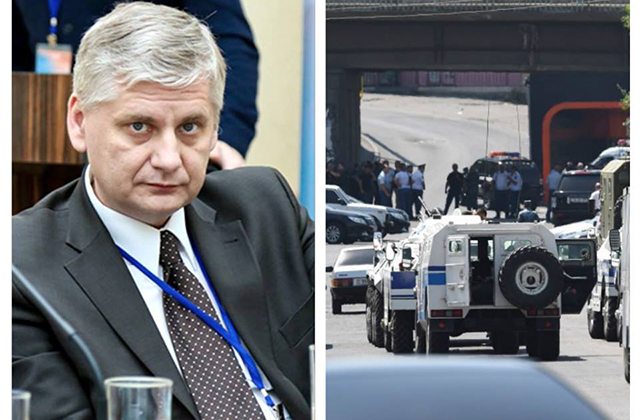The situation in Armenia, first and foremost, has not external political, but internal reasons: Sergey Markedonov on developments in Yerevan, Moscow’s lessons learned and NK conflict

Interview with Sergey Markedonov, Director of the Department for Problems of Ethnic Relations at the Institute for Political and Military Analysis in Moscow, PhD in Historical Sciences, columnist, politician, expert of Russian Council on Foreign Affairs.
Mr. Markedonov, “Sasna Tsrer” group in Yerevan continues staying in the police patrol regiment, the situation is critical. What internal and external reasons do you observe in Yerevan developments?
The situation in Yerevan, first and foremost, has not external political, but internal reasons. It’s clear that the crisis existent in the country towards the authorities generated as a result of distrust and deep discontent. Neither Central Intelligence Agency (CIA), the Federal Bureau of Investigation (FBI), nor any other foreign organization can instigate widespread discontent in a country, where there is no precondition for it. Obviously, reasons are existent.
It’s another point, that a clear, comprehensive program on overcoming the situation hasn’t been introduced among those opposing the authorities. Common words and formulations are rather numerous. I’m following the discussions on Armenian social networks with great attention, I observe that feelings reached to a great level, formulations like “You, Russians, should leave Armenia”…Ok, if we leave—what will come next? Who will guarantee Armenia’s security, when there is Turkey, Armenia-Turkey closed borders, unsettled NK conflict? A question arises here: which country instead of Russia? This question remains hanging in the air.
Do people taking the Police patrol regiment have economic development plan? What do they think of taxes, tariffs? Seemingly, these are boring questions, however, more obviously, it’s impossible to go ahead without putting forward these questions, feelings are overwhelming. I don’t consider that this is a matter of Armenia’s external order. External actors in this situation are observers. As for the role of foreign companies and NGOs, then that role may be certainly productive, if there are internal prerequisites for that.
I’d separate the situation in Yerevan into two parts. The first one refers to the concrete situation of seizing, hostages have been released, but what to do after that? The situation was different when there were hostages. This is a private issue. This may be solved through this or that means. There are more serious issues, discontent from the authorities. God willing the situation has a peaceful settlement, however, the issue is existent and such speeches can’t continue, radicalism has deepened among the society.
By saying out of external reasons, I mean NK conflict and developments around it. Rather different expert opinions are existent, that the process was initiated against negotiations or intention of RA authorities on conceding territories. What do you think of these allegations?
I think Karabakh component is also existent, however, not on the foreground. April tension on NK conflict zone showed which issues are available in Armenia’s governing system. Historians frequently say (I’m also a historian) that the Crimean war, which broke in 1853 showed inability of feudal Russia. The situation in Karabakh in April showed serious issues, not only in Armenia’s military structure, but in the whole system of governance. Of course, it heated the situation, as for Armenians, for those among the authorities, the opposition, Karabakh is a serious issue, in this sense I consider Karabakh scenario of utmost importance.
In your opinion, how will the existent situation be reflected on negotiations?
Indirectly, maybe negotiation process will fail. If we imagine, that destabilization is recorded in your country, your neighbors may make use of it. However, these are indirect issues, I don’t think such a connection will exist.
Mr. Markedonov, members of the group, activists, politicians standing on the platform of Khorenatsi street, much circulate the issue of withdrawal of territories as a reason for the existent situation. In your opinion, was this issue touched upon in the previous negotiations, that it’s being so actively discussed?
The situation should be clarified. The so-called “Lavrov plan,” which they started to discuss, I saw yet in last October’s publication of Deutsche Welle, which said that Russia will exert pressures over Armenia for the purpose of territory withdrawal, to strengthen its positions in Azerbaijan. I don’t understand how and where elementary logic is. First and foremost, that plan, which nobody has seen, and discussion of what lacks, in my opinion, is simplicity. It reminds a theory of conspiracy. Concrete issues should be discussed. If there is no any plan, what should we discuss?
As for Russia and its logic, it needs to be understood. Russia won’t change its game rules and there is no serious ground for that. No side obliges the other side withdraw territories, nobody make Moscow return territories, moreover, when the territories don’t belong to us. Let’s discuss the issue from the perspective of interests—what interest does Moscow pursue? Will Azerbaijan rejoice and withdraw from the 1994 agreement, will it direct its energy projects to Russia?—Obviously not.
The fact that the authorities are going to withdraw territories, I heard yet from the 1990s. In 1994 it was already being touched upon that Levon Ter-Petrosyan will concede everything, which was followed by his resignation, as, he seemingly intended to concede the territories, or such an issue was set. Now they say the same in case of Serzh Sargsyan, if tomorrow, even, for instance, Nikol Pashinyan becomes a president, they’ll say—Pashinyan wants to concede something. This has become an issue of political speculation. One should realize that in any case Armenia’s authorities can’t put forward maximalist plans on the negotiation table.
Let’s imagine that Serzh Sargsyan comes to the meeting and claims why he should discuss any issue regarding the withdrawal of 5 territories with the Azerbaijani side. In this case, how do you imagine continuation of negotiations? If you don’t imagine, then it should be realized that they’ll attempt to seek for exits from the existent situation, to maneuver. Tomorrow Pashinyan or any other person will also do that. Can anyone say tomorrow he doesn’t recognize Madrid principles? Of course, he won’t. Thus, it seems to me, that in this situation more sober judgement is necessary. Of course, you’ll say you’re in Russia, that’s why you speak that way, however as an expert, I observe, that extremely sensitive decisions don’t support the situation.
Obviously Armenia’s authorities don’t want to solve the issue through an attack and negotiations somewhat continue. The crisis is existent, there is no attack, withdrawal from the authorities at the moment is not realistic. In your opinion, how should be the existent situation puzzled out?
I can’t formulate the solution, it will be dilettantism from my side, as I’m not a participant of processes in Armenia, for me it’s difficult to propose definite solutions, in particular, observing the situation at a distance.
Why don’t the authorities attack? As an expert, I may explain, as both the authorities, and those participating in hostage-taking, are people fought in Karabakh. Karabakh brotherhood can’t be violated, blood can’t be shed between one another, it’s bad. Of course, memory of bloody events of the 2008 are added to this, main responsible for which was Kocharyan, and not Sargsyan, although, in any case, he was next to Kocharyan. In this situation the abovementioned factors prevent Sargsyan from exertion of force.
In my opinion, the situation will be solved, when there is a possibility to save the figures, when the authorities may record some victory, and those, who are against the authorities won’t either be regarded as completely destroyed. This is a comparatively compromising formula, if the authorities release them, tomorrow again some people will take some buildings, as the authorities don’t attack, do they? Thus, it’ll continue until Maidan is recorded.
In your opinion, what lessons should Russia learn from the existent situation in Armenia?
Lessons should have been learned long ago. Russia should have contacts in Armenia, not only with the leading group, but with a wider layers of Armenia’s society—universities, mass media, human rights organizations, NGOs, all political powers. Russia should understand that Armenia is not only Serzh Sargsyan. I don’t say Sargsyan is a bad or a good one, it should be decided by the people of Armenia. You should decide and clarify, but we should understand that Armenia is not him, his group and supporters.
By Araks Martirosyan

























